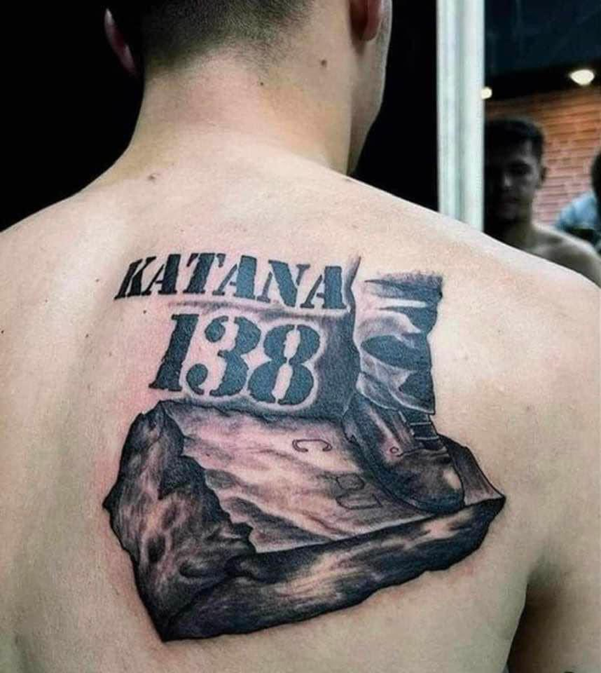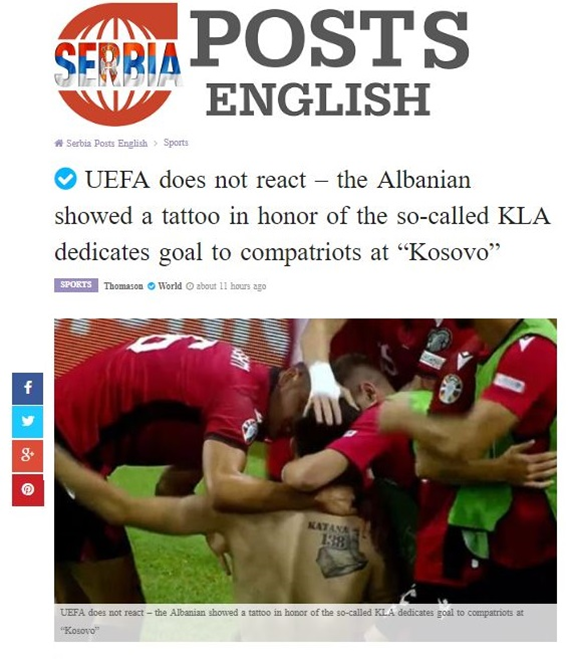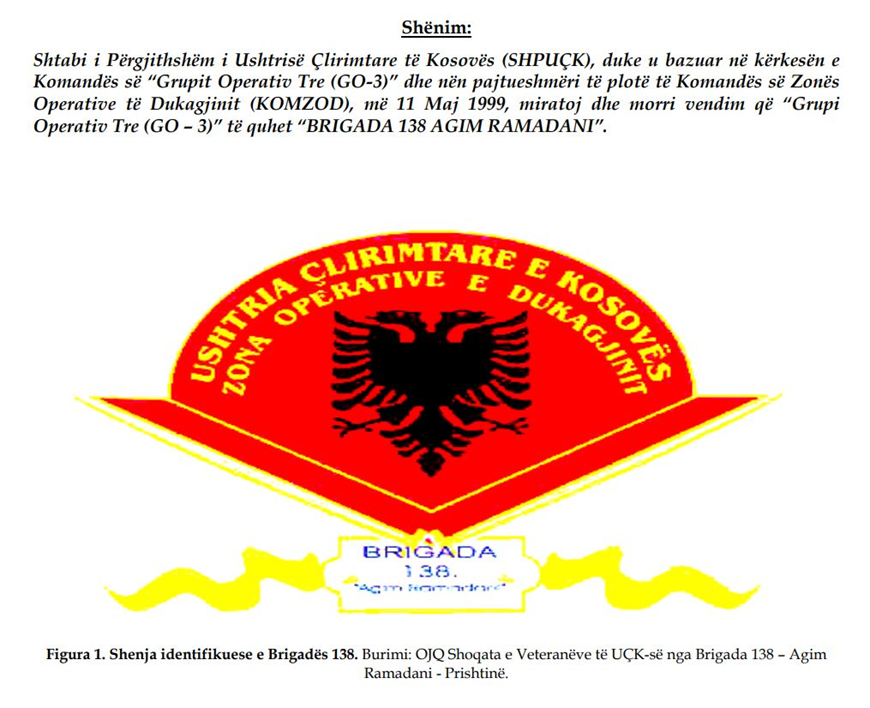The match on September 10th between the Albanian national team and Poland at the “Air Albania” stadium in Tirana turned into fodder for propaganda in some Serbian media outlets. It all began with the gesture of the goalscorer for the Albanian team, Mirlind Daku, who removed his national team jersey, revealing a tattoo on his right shoulder in honor of the Kosovo Liberation Army (KLA) fighter, Agim Ramadani. Serbian media dubbed this act as provocation, referring to Ramadani as a “terrorist,” a narrative based on misinformation and hate speech.
Jona Plumbi
Regional media extensively reported on the “outrage” in several Serbian language articles due to the exposure of the tattoo by Albanian national team goalscorer Mirlind Daku. The detail that caused the uproar was the tattoo symbol on the athlete’s shoulder, the Katana, which identifies the KLA fighter Agim Ramadani, along with the number 138, which corresponds to the brigade he commanded.
The Gjilani striker made the celebratory gesture after scoring the second goal for the Albanian national team against Poland at the ‘Air Albania’ stadium in the qualifiers for the 2024 European Championship.

*Image of the footballer Mirlind Daku’s tattoo
UEFA punished the Albanian footballer with a yellow card based on the match regulation, which state that when a player celebrates a goal by removing his shirt or covering his head with it, he will receive a yellow card.
Daku declared that he dedicated the goal to his family and all the martyrs of Kosovo who sacrificed everything for their homeland.
“I dedicate it to my family, who has always supported me, but also to all the martyrs in Kosovo who have given everything for the homeland and have contributed to bringing us all together from all regions to play with this jersey”, stated Daku after the victory.
Serbian Rhetoric
“He scored a goal for an important victory in the qualifiers and then displayed a large tattoo of a UÇK (KLA) terrorist.” – This is how the Serbian media outlet Blic.rs described the gesture of footballer Mirlind Daku. It goes on to portray Daku through Serbian nationalist rhetoric, referring to him as “born in Serbia, in Gjilan.” Serbian media outlet Blic.rs concludes another article about the incident with the sentence, “Let’s see if UEFA will react to this”.
Even the Serbian media outlet “Serbian.posten.com” sought UEFA’s response to this action. “Although known for the idea that politics should have no place in sports, UEFA’s reaction has been missing for the moment,” it wrote.

The rhetoric escalated further, “enriching” it with some untruths, such as:
- A major scandal! The footballer showed the shoe that stepped on Koshare’s symbol, praised the KLA as terrorists, and spoke of Greater Albania: Let us unite all our territories!– Blic.rs
- Polish fans who came to visit the capital of Albania cheered before and during the match: “Kosovo is Serbia.” – Serbian.posten.com
- Mirlind Daku called for the “unification of all Albanian territories” while glorifying the KLA as terrorists. – Serbian.posten.com
The article by the Serbian media outlet Blic claims that Daku called for the unification of Albanian territories when, in fact, he publicly thanked those who “contributed to bringing us all together from all regions to play with this jersey”.
The video itself, which Blic.rs published alongside the false quotation, contradicts the article’s claim. A post on the social media platform Twitter (X) under the name “Kosovar Football” translated the statement wrongly and included the video.
The news of the Serbian media’s reaction and their appeal to UEFA was widely covered in Albanian-language media outlets.

headlines of Albanian news articles regarding the Serbian media’s reaction
Often, the media quoted other regional media regarding the claim raised in Serbia:
“He took off the Albanian jersey, revealing the tattoo on the footballer’s back – the broken stone on the Kosovo-Albania border – and ‘Katana 138’ dedicated to Commander Agim Ramadani. The Croatian media ‘Dnevnik’ writes that due to the display of this tattoo, various media outlets in Serbia have called for the condemnation of the Gjilan attacker.” – KOHA reports.
What Does “Katana 138” Symbolize?
“Katana” is the nickname by which Commander Agim Ramadani is known, one of the most prominent and active fighters of the Kosovo Liberation Army, commander of the Koshare area (Ferizaj). He was born on May 3, 1963, in the municipality of Gjilan and became a martyr on April 11, 1999, in Koshare during a battle with Serbian forces.

statue in Kosovo
In the Battle of Koshara, where he was also killed, Ramadani was the commander of Brigade 138. After the war ended, he was awarded the title of Hero of Kosovo. The Battle of Koshare lasted for 77 consecutive days, starting on April 9, and ending on June 19, 1999.
The Third Operational Group (GO – 3) operated under the General Staff Command of the KLA through the Operational Zone Command of Dukagjin (KOMZOD) and consisted of three military operational units:
- Brigade 131;
- Brigade 134;
- Counter-Surveillance Battalion,

These units were established by order of the Minister at the Ministry of Defense of the Republic of Kosovo – Mr. Colonel Ahmet Krasniqi. Later, “GO – 3” was renamed “Brigade 138 – Agim Ramadani”.
Serbian nationalist rhetoric labels Ramadan as a “criminal and terrorist,” spreading false information with the aim of inciting nationalist sentiments among the Serbian population through hate speech. A reflection of this rhetoric is easily found today on Serbian websites, where Ramadan is portrayed as the “right hand of Ramush Haradinaj and his terrorist gang that has been ravaging Kosovo for decades, committing numerous crimes.”
Even though Ramush Haradinaj has been acquitted twice by the Hague Tribunal for war crimes charges, Serbian nationalist rhetoric persists in portraying him and other distinguished fighters of the KLA as criminals.
Conclusion
Often, football matches turn into the perfect arena for making daily politics by fueling nationalist sentiments, hate speech, and creating misguided perceptions through disinformation. This was also the case with the Albania – Poland match, where the tattoo of a National Hero in Kosovo is condemned in Serbia as an image of a terrorist and criminal.
The historical debate between Serbia and Kosovo regarding the latter’s status, Serbia’s non-recognition of the Republic of Kosovo, and its insistence on calling the KLA a terrorist organization occasionally leads to news and claims raised against various figures of Kosovo’s liberation war.
The latest victim of this “nationalist hysteria” is the KLA fighter Agim Ramadani and the footballer from Gjilani, Mirlind Daku, who is unjustly portrayed as a “promoter of Greater Albania” by Serbian media.






